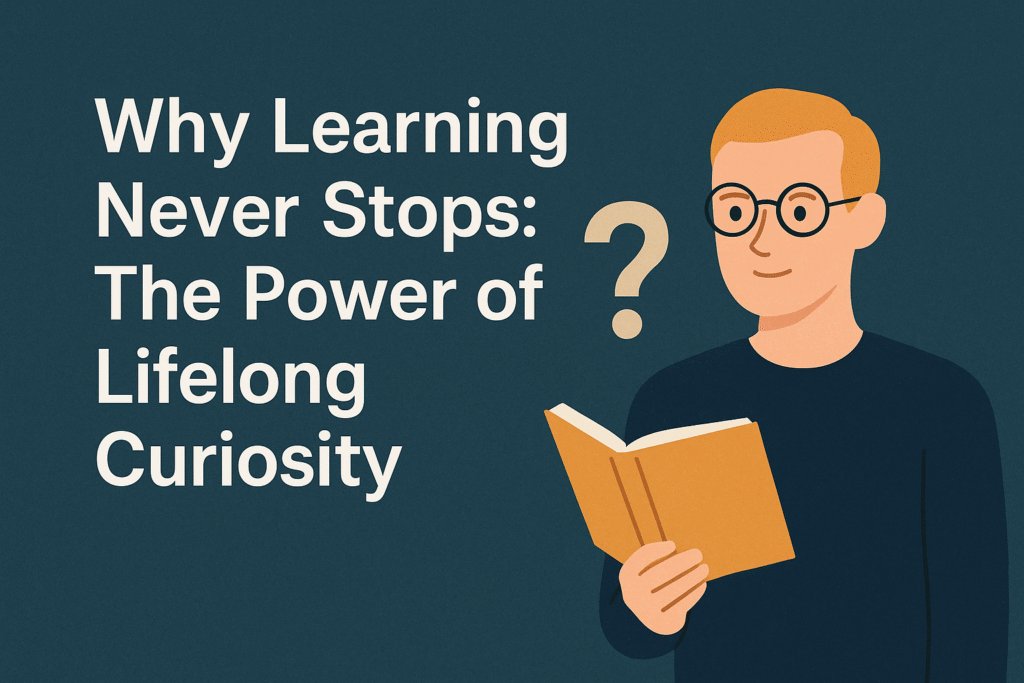Have you ever met someone who’s always reading, asking questions, or trying something new — even well into their later years? That’s the power of lifelong curiosity. It’s not just about school or formal education. It’s about maintaining a mind that never stops exploring, questioning, or growing
In this blog, we’ll explore why learning is a lifelong journey — and how curiosity is one of the most powerful tools you can develop.
1. Curiosity Keeps Your Brain Young
Your brain is like a muscle — the more you challenge it, the stronger it becomes. Studies have shown that people who stay mentally active throughout their lives are less likely to experience memory decline and cognitive issues.
Learning new things builds new connections in the brain, helping keep your mind sharp, agile, and resilient.
“Once you stop learning, you start dying.” – Albert Einstein
2. The World Is Always Changing — So Should You
We live in an age of rapid change. Technology evolves daily. Science rewrites what we know. The economy shifts. Global issues emerge.
If you’re not constantly learning, it’s easy to fall behind. Staying curious ensures you stay adaptable, informed, and equipped to navigate whatever comes next.
3. Curiosity Fuels Creativity and Innovation
Every major invention or breakthrough began with a single question: What if…?

People like Leonardo da Vinci, Marie Curie, and Steve Jobs weren’t just knowledgeable — they were relentlessly curious. Their desire to learn more and dig deeper led to revolutionary discoveries and ideas.
When you’re curious, you’re more likely to make connections others miss — a key ingredient for creativity and innovation.
4. Continuous Learning Drives Career Growth
Want to stay competitive in your career? Be a lifelong learner.
Employers today don’t just look for degrees — they want adaptable thinkers, problem solvers, and people who can grow with the company. Learning new skills, exploring new industries, or simply staying up to date with your field increases your value in the workplace and opens doors to new opportunities.
5. It Makes Life More Engaging
Curiosity transforms the ordinary into something extraordinary. When you’re curious, every conversation, object, or experience becomes a chance to discover something new.
Whether you’re exploring a new topic, mastering a hobby, or simply asking better questions — your day-to-day life becomes more meaningful, vibrant, and exciting.
6. Learning Supports Mental Health and Well-Being
Lifelong learning doesn’t just make you smarter — it can make you happier.
Engaging your mind through learning provides a sense of purpose and structure. It boosts confidence, improves self-esteem, and can even help combat anxiety, depression, and burnout.
Especially during times of change or challenge, learning can be a stabilizing and empowering force.
7. You Don’t Need a Classroom to Learn
Today, learning is everywhere — not just in books or formal lessons. You can grow through:
- Listening to podcasts or interviews
- Watching documentaries or online courses
- Practicing new skills, hobbies, or crafts
- Having meaningful conversations
- Traveling and experiencing different cultures
Being curious doesn’t require special tools — just a willingness to stay open.
Final Thought: Keep Feeding Your Curiosity
The journey of learning never ends. The most fulfilled, creative, and successful people are often those who never stop asking questions or exploring new ideas.
So ask more questions. Seek new perspectives. Stay open to change. The more curious you are, the richer your life becomes — personally, professionally, and intellectually.
Simple Ways to Stay Curious Every Day:
- Read at least one new article, book chapter, or blog post daily
- Watch something educational or inspiring
- Take notes when something surprises you or makes you wonder
- Try something outside your comfort zone
- Follow people who challenge your thinking
Curiosity is not just a trait — it’s a mindset. And it’s one of the best ones you can have.
Would you like a header image, infographic, or short summary for social media?